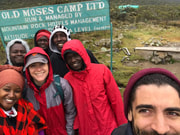|
Benjamin Muhoya recently transitioned from a research assistant with the THGP to a graduate student at Princeton University (where he is mentored by Dr. Julien Ayroles). In this post, Benja writes about this important and exciting transition.
I have had big transitions in my life but joining Princeton University as a Grad Student has been the biggest transition I’ve experienced so far. I always knew that I wanted to pursue a career in the sciences, and hence I chose to do a B.Sc. in Medical Laboratory Science with the hope that I could perform ‘experiments’ in the lab that would be of benefit to society in one way or the other. Little did I know that my passion for science and discovery would land me a scholarship in one of the best universities in the world. Princeton’s EEB Department is well known for being a leader in the field of Evolutionary Biology. I am thankful for being a grad student in the department since I now have numerous resources at my disposal to make my research goals a success. My plan is to leverage these resources and use them to determine if observable phenotypes associated with non-communicable diseases (NCDs) arise when a person experiences a lifestyle transition that causes a mismatch between their environment and their evolutionary adaptations. For me, it is always exciting working in the lab and even more exciting doing field work with communities in the remote areas of Kenya. These communities are not only rich in culture, but also in other ways that can only be explained by the science that we are doing. Personally, I hope to demystify the complex interactions between our genome and the environment to pinpoint which specific transitions in life (e.g., active to sedentary lifestyle, rural to urban migration, or dietary transitions) lead to increased risk of NCDs such as hypertension and obesity. To do so, I will approach these diseases from an evolutionary lens, because as it has famously been put, “nothing makes sense except in the light of evolution”. It is my hope that I get to work with more communities in remote areas around the world, because I believe that the data we generate will inform our understanding of the pandemic rise in NCDs. This knowledge is especially useful for developing countries that are suffering under the burden that soaring NCD rates place on the healthcare system. Additionally, communities in remote locations stand to benefit the most from our results since they are currently experiencing lifestyle transitions at such a rapid pace.
1 Comment
|
Archives
January 2023
AuthorSThe content here is provided by all members of the Turkana Health and Genomics Project. Amanda Lea maintains the website. |
 RSS Feed
RSS Feed
